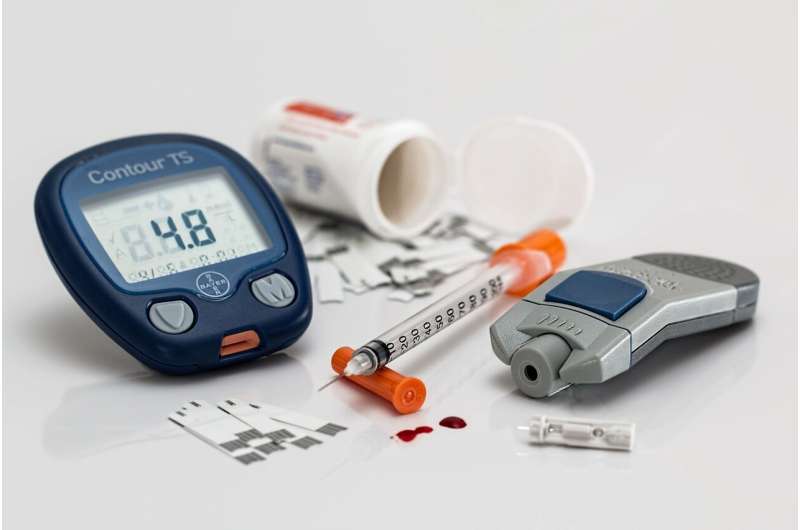Study links longer exposure to obesity and earlier development of obesity to increased risk of type 2 diabetes

Cumulative exposure to obesity could be at least as important as actually being obese in terms of risk of developing type 2 diabetes (T2D), concludes new research published in Diabetologia. The study is by Dr. Juhua Luo, School of Public Health, Indiana University, Bloomington, IN, USA, and colleagues.
Although obesity is a well-established risk factor for T2D, little is known about the relationships between age of onset of obesity and cumulative exposure to obesity and risk of T2D, especially among young adults. In this study, the authors used data from the Australian Longitudinal Study on Women's Health (ALSWH) to identify body mass index (BMI) trajectories over the early adult life course. They then examined the relationship between distinct BMI trajectories and risk of T2D. Also investigated were the associations between timing of obesity onset, obese-years and T2D.
Women aged 18-23 years at baseline (n=11,192) enrolled in the ALSWH in 1996 were followed up about every three years via surveys for up to 19 years. Self-reported weights were collected up to seven times. New cases of T2D were self-reported. A total of 162 (1.5%) women newly developed T2D over an average of 16 years of follow-up. Six distinct BMI trajectories were identified, varying by different initial BMI and different rates of increase of obesity.
Higher initial BMI was associated with an increased risk of diabetes. Increased age at onset of obesity was associated with a lower risk of diabetes, with a 13% lower risk of developing T2D per one-year delay in onset. A higher number of obese-years was associated with increased risk of developing T2D. Obese years is calculated by person's BMI minus the BMI for obesity (30), then multiplying by the number of years of exposure. The authors estimate* that for each extra 10-obese years, the risk of diabetes increased by 25%.
Among 10,521 (94%) women who were not obese at baseline, the researchers observed that women who became obese during follow-up had a 3-fold increased risk of T2D compared to women who remained not obese. More specifically, compared with women who did not become obese during the follow-up, women who became obese and had obese-years of <10, 10 to under 30, and 30 or more had increased risks of developing T2D of two, three and six times, respectively.
Results of analysis using only the women's initial (baseline) BMI found that having baseline obesity (a BMI of 30 or more) was associated with a 7-times increased risk of developing diabetes, while overweight women (BMI 25.0 to 29.9) had a 2.3 times increased risk compared with women with normal weight.
Analysing how the women's BMI developed through the study, those who were already obese at baseline, but who continued to put on weight rapidly on top of this had 10-times increased risk of developing diabetes compared with normal weight women who remained stable; women who were overweight (rather than obese) at baseline, and who put on weight rapidly, had a 5-times increased risk of diabetes compared to the normal weight women who remained stable.
The authors found that further analysis adjusting the data for the number of children, dietary intake (including total energy intake), fibre intake, and dietary glycaemic index (how foods with different carbohydrate composition affect blood glucose levels) gave similar results.
The authors say: "More than half of the women experienced a rapid BMI increase from early (18-23 years old) to middle adulthood (37-42 years old). Our data confirmed that BMI in young adulthood played an important role in the subsequent risk of developing type 2 diabetes during adulthood. We also observed that women who were non-obese at baseline but became obese during follow-up had a higher risk of type 2 diabetes relative to women who stayed non-obese; the younger the age at onset of obesity or the greater the obese-years, the higher the risk of type 2 diabetes."
They add: "Our data also indicated that baseline BMI among young women was significantly associated with risk of developing type 2 diabetes...The results highlight the importance of overweight or obesity in early adulthood as risk factors for adult diabetes, indicating that weight control starting before early adulthood is critical for reducing type 2 diabetes risk in later life."
They conclude their work demonstrates "the importance of preventing or delaying the onset of obesity and reducing cumulative exposure to obesity to substantially lower the risk of developing diabetes. We recommend that people self-monitor weight change over time, and that health care providers look at weight change in addition to current weight as another risk factor for diabetes."
More information: Juhua Luo et al. Age of obesity onset, cumulative obesity exposure over early adulthood and risk of type 2 diabetes, Diabetologia (2019). DOI: 10.1007/s00125-019-05058-7





















